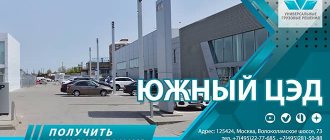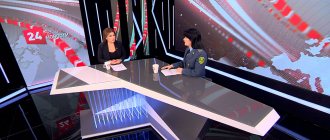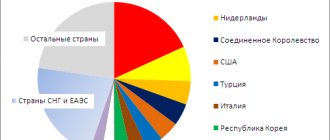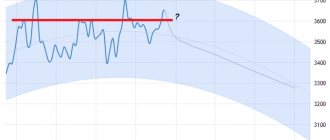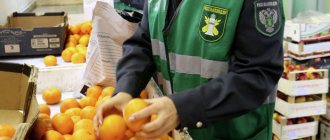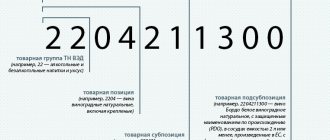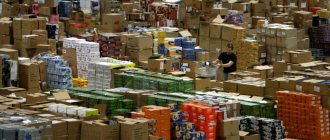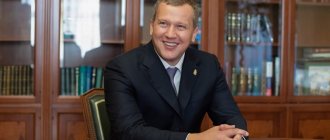“Where do the clans come from? The management... it's a tree-stick... it's small."
Goloskokov positions himself as an official open to the press, but admits that he cannot speak openly on some topics photo - Vladimir Zhabrikov
In a conversation with our agency, Vyacheslav Goloskokov explained why he moved from Moscow to Yekaterinburg, what he saw in his new subordinates and which of them he intended to lay off.
Vyacheslav Ivanovich, you headed the Ural Customs Department during a crisis and are forced to start work with necessary, but extremely unpleasant for your subordinates orders regarding optimization. How will this process work?
— You can’t do without optimization, but it won’t be done head-on. We will combine - in some places we will cut people, and in others we will simply reduce costs. The main task is this: to reduce the costs of customs control, but without causing damage to production and business.
— They say that Magnitogorsk customs can be completely reduced.
— Magnitogorsk customs remains at the moment... Of course, people will have to be laid off. Personnel must match the volume of tasks performed. But I can’t answer in more detail yet. Until there is a decision from the Federal Customs Service, it is somewhat premature to say.
- How will things be in the north - in the Khanty-Mansi Autonomous Okrug, the Yamalo-Nenets Autonomous Okrug, the Tyumen region?
- They are important, I think that we will not touch these customs for now... Although, of course, some things will have to be cut. I repeat once again that optimization is a flexible, comprehensive approach to reducing not people, but costs. We must reduce costs by 10 percent. This will be done in different ways. And laying off employees is just one way. In addition, we will reduce bonus payments, reduce motor transport, costs for gasoline, communications, security, and liquidate excess property.
Now I’m flying to Moscow for college. They will clearly tell us which optimization plan the FCS is leaning towards, and I will go to the regions with specific solutions. I will watch, talk, announce, organize. After all, in parallel there will be a continuous process of technical development of customs, the development of intelligent customs control. Time requires a new customs officer - a digital technology person who can work with a large amount of information. And the main task facing the entire customs service is related to the revolution that will soon occur in the entire customs business. We are talking about the creation of a customs code of the Eurasian Economic Union - with new approaches to risk management and automation of customs control processes.
— You can develop endlessly, but if there are no cargoes, then there will be nothing to work with. Due to the currency crisis, sanctions, and anti-sanctions, the volume of foreign trade turnover fell throughout the country. But they say that at Koltsovskaya customs this figure has also decreased due to very strict control. Cargo carriers allegedly try not to interfere with our airport, preferring to clear customs, for example, in Moscow, where the rules are more liberal.
- I don’t have such data. Freight transport is falling across Russia. But here we have, for example, Ural Airlines, they mainly transport spare parts for their aircraft. And they didn’t have one less spare part.
— Let me ask the question differently: are the rules at our Koltsovo customs different, for example, from Domodedovo?
- I'm not authorized to talk about this.
— In your opinion, are there problems in the local customs authorities?
“I don’t call them problems, I call them areas for improvement.”
— What areas for improvement do you see?
- What do you think?
- I'm not an expert. As a layman, it seems to me that everyone around us is taking bribes.
- All? Give us a list and a statement to the prosecutor's office. Have you ever been asked to?
- Who will demand from me? I’m not a shuttle trader, I’m not a participant in foreign economic activity.
— Bribes are given by those who want to evade legal requirements. There are two sides to this problem—the bribe-giver and the “bribe-taker.” Our task as customs authorities is to do everything so that we do not have “bribe takers,” but we will fight bribe givers.
— Do we have “bribe takers”?
— We have official statistics. Last year, criminal cases of bribery were opened. There was a case in Chelyabinsk, and here in Yekaterinburg, an expert took ten thousand to speed up the registration of four boats. In general, I believe that we need to look at how many crimes are committed per 100 thousand population. And to extrapolate this situation - how many bribe takers are here or there.
— Before heading the UTU, you worked as the head of the risk and operational control department of the Federal Customs Service of Russia. You are probably well aware of the story with customs officers from Domodedovo, where six employees were detained for taking bribes. Is this a situation typical for all of Russia, or an exception?
- Let's wait for the trial.
“The head of Domodedovo customs, Alexander Popov, said: “We all know very well that we live in such a country that this has been the case from time immemorial.” He is right?
“I know Alexander Nikolaevich Popov very well, I know very well the conditions under which he has to work. Everything is very difficult. And people - yes, criminal cases have been opened against them. Let's wait for the trial. As for whether this is a widespread phenomenon, I’ll ask again: did they charge you?
- There’s nothing to take from me.
- Let's find at least one person from whom they demanded a bribe. We don't have such cases. Where are the statements? You're talking theoretically. You are talking about Domodedovo, but it is in Moscow. There are responsible people there. Let them sort it out. And I am the head of the UTU. Why do we need to talk about Domodedovo?
- How did you get to us?
- I was sent to work.
— Do they really just leave a normal position in Moscow and go to the region?
- Why do you think that my position was normal? Why do you think it's good there? Have you lived in Moscow? Moscow is a city for work, but not for living.
—Have you come here to rest?
- Don't rest. Live and work.
— Did you bring your family with you?
- Yes, sure. My wife was there yesterday. Now she has flown away, she will make a list of necessary things, pack them and return.
— Do you already have an apartment here?
- Yes. Service.
— Would you like to buy your own and settle down?
— I left home at the age of 18 and have been wandering ever since. I've lived in 25 places. You can work anywhere. And it is necessary. Wherever the service needs it at the moment. It is difficult to find a boss in an Office that is already ready. I have a total of eight years of experience in managing the regional customs department. The regional customs department is a concentration of tasks, where the main product is created. And therefore, every time the search for the head of the RTU is a complex process. And here it also dragged on for a number of reasons.
- What are the reasons? Why did UTU remain without a “head” for so long after the death of Vladimir Sorokin?
- This is not a question for me, this is for management. I’m an official, I’m in the hierarchy. Everything must be in strict accordance with corporate ethics.
— The fact that it was you, a competent specialist, who were sent here, to the Urals, should tell us something?
— I’m not literate, I’m just a good specialist. I have been in the customs authorities for 20 years, participated in the writing of the customs code, I have 10 publications.
- I heard that you were exiled here from Moscow.
- What did I do wrong?
“They say they minded their own business.”
— I always work within the framework of the law, in strict accordance with my job descriptions and, in fact, I can never get into things where I don’t need to. I always apply moisture where necessary (laughs).
- Well, maybe they annoyed someone.
- I don’t even have salt - just add some salt.
— What are your impressions of the new team?
— As for management, I immediately felt in my place. A very familiar atmosphere, absolutely everyone is competent, understanding, highly professional specialists. They understand perfectly. We speak the same language. And I would compare the city with Nizhny Novgorod. Nizhny Novgorod lives in the shadow of Moscow, but it is the soul of Russia.
— Literally a few days before your appearance in the department, a struggle began between the clans. Taking advantage of the fact that a new boss is coming, some want to bait others. Have you already felt this activity?
- Is it true? Where do the clans come from? The management is... small... Well, that's okay, you know, I'm used to having my own opinion about everything.
- How will you form it if on the one hand they tell you one thing, on the other - another?
— I have been working as a boss for a long time and have long known a phenomenon called “leader loneliness.” If you have not created different channels of communication, then you will be alone, and deaf, and blind. And you will not be able to make adequate management decisions. I know how to collect and analyze information. Every normal leader must create an information field for himself in order to have real information and understand who is working and how. You don’t have to be a rocket scientist to come to this or that customs office and understand how everything works there.
Know where to buy
The head of the Main Directorate of Risks and Operational Control of the Federal Customs Service, Vyacheslav Goloskokov, told RG about this. And he added: “Time is money.”
This means that customs officers will stop several times less often to inspect a truck, using a risk management system (RMS), thereby saving time and money not only for businesses and the state, but also for end consumers of goods. The risk management system is a fairly closed system for official use.
However, for Rossiyskaya Gazeta, Vyacheslav Goloskokov revealed some details of her work. And, by the way, they concern not only business.
Vyacheslav Ivanovich, your department is figuratively called “customs intelligence.” Let's explain to readers what kind of system this is - risk management. Does it still concern ordinary citizens?
Vyacheslav Goloskokov:
Including. After all, what is risk management? This is the analysis and determination of the area of risks, the development and application of measures to minimize them.
Suppose, as a result of the analysis, it turned out that air passengers, individuals, import branded goods from Milan at a high price, which exceeds the norms for duty-free import by air established by the legislation of the Customs Union - up to 10 thousand euros in monetary terms and 50 kilograms of weight. These flights will definitely be in a high-risk area, which will require additional human resources for customs control.
Another situation. A flight arrives from Japan to Sakhalin. There is practically no one there to check. Why? Because the Japanese are extremely law-abiding and the likelihood that someone is carrying illegal goods is minimal. It was another matter when our drillers returned from Vietnam, who had worked there for three weeks on a rotational basis. We, of course, knew that this was a high-risk flight. As a result, they discovered everything - lemurs, pearls, gold.
All this requires declaration.
Or a flight from Ashgabat. The risk here is understandable, because this is a drug-dangerous area. What will customs officers do? Of course, look for drugs.
That is, the system also works for security?
Vyacheslav Goloskokov:
Security has many aspects. There is security for citizens, so that safe products are supplied to the market, and there is economic security, so that due payments are paid in full.
The duty is not only a fiscal instrument, it is also designed in such a way that our manufacturer is protected from dumping. Any production in our country will a priori be more expensive than in the south of China, where it is warm, there is no snow and investments in capital construction are minimal. Try building a factory here. And in the south, you put up walls, covered them with a roof, and let out the goods. The duty is needed in order to equalize conditions on the market. And one of the tasks of the customs service is to create an equal competitive environment so that the goods of a foreign manufacturer do not receive an unjustified advantage over the goods of our compatriot.
The exhibition “Customs Service 2013” opens today.
This new product was shown 7 years ago. She's been in business for a long time. Photo: Victor Vasenin/RG
The art of risk management lies in the fact that by analyzing a large amount of information, we identify areas of risk and act precisely. Suppose there is evidence that in the northwestern direction the amount of imported Vietnamese fish at a low price has increased. We conduct an analysis and see that a group of companies has appeared on the market that imports fish with a significant deviation from the world price. This indicates possible evasion of customs duties.
What types of customs risks, in your opinion, are most serious today for the population and the budget?
Vyacheslav Goloskokov:
All risks are serious. For example, the risk of non-compliance with bans and restrictions on the import of unsafe goods. Let's take radio stations and everything related to radio emission. Such products require not only permission, but also approval for their operation in a certain range. Someone, suppose, wants to introduce a large batch of these radio-electronic equipment without approval. Such an importer falls into a high-risk zone.
There are also risks associated with non-payment of customs duties. This is an understatement of customs value, substitution of the country of origin, product code, and the like. Now the Customs Union has established anti-dumping, that is, protective duties, on Chinese bearings (31.3-41.5 percent of the cost. - Author's note). A special investigation proved that China is dumping on this market. What does an illegal business that wants to circumvent this prohibitive duty do? He transfers the goods to another country, for example, a country in Southeast Asia. There he receives documents from that country and imports the goods into the Russian Federation, changing information about its origin. We evaluate the dynamics of imports of bearings from various countries and production volumes. This is the source material for risk analysis and identification.
Can businesses “repaint” bearings in other countries?
Vyacheslav Goloskokov:
And we are monitoring the entire process. The risk management system is a huge network, with its own indicators that are barely noticeable to the prying eye.
There are 4 times fewer customs inspections for companies, and cases of requests for additional documents have been minimized. The release time for goods classified as low risk decreased by 2.5 times and averages 11.6 hours of working time
Now we are concerned about the illegal import of tires. The volume of this market is large, many countries are involved in their production. There is a high duty on them, but the price range for them is wide and it is important to establish exactly what kind of tires are imported. A set of tires for a luxury car is one thing, but tires of the same size, but from a different manufacturer, from a different country, for a different type of car, are quite another. The difference is five to ten times. A big temptation for some is to import expensive tires under the guise of cheap ones. For our analysts, it's all about data collection.
This is what customs authorities do, which can be called customs intelligence. Our employees constantly systematize hundreds of parameters to identify risk areas and set indicators.
How many such databases do you already have?
Vyacheslav Goloskokov:
To identify risks, more than seventy sources of information are used, as well as information obtained under agreements with other federal executive authorities for the exchange of information. The total volume of information is about 22 terabytes. Customs declarations of all participants in foreign economic activity (FEA) have been stored in our databases since 1993 and are also used in the analysis.
Criminals hid heroin in this wooden elephant. They didn’t hide it... Photo: RIA Novosti www.ria.ru
Can any product be risky?
Vyacheslav Goloskokov:
Almost anyone. This includes clothing, shoes, and food. Let's imagine the situation. Russia's chief sanitary doctor has banned the import of dairy products from the Baltic country. And some, despite the ban, are ready to import it further into Russia. At the same time, he declares that he imports not milk, but juices or sausages.
But customs must comply with the decision of the chief sanitary doctor. So that no one has the opportunity not only to import prohibited products under their own name, but also to import them under the guise of a “cover” - chips, green peas, drinks. To do this, we display indicators, or, as they are also called, “risk profiles,” and promptly send them to checkpoints for use when goods cross the state border. Therefore, if a ban is imposed on the import of milk, then customs also checks other imported goods, because a certain proportion of participants in foreign trade activities can carry another product under the guise of one product.
What if milk, cheeses or sweets prohibited for import go on a detour, through Belarus or Kazakhstan, since the internal borders of the Customs Union are open?
Vyacheslav Goloskokov:
How do we operate within the Customs Union? We have already organized a regular exchange of databases with Belarusian and Kazakh colleagues. A unified system with unified risks and work methods is being formed.
Eighteen meetings of the working group on risk management at the Joint Board of the Three Customs Services have already been held on this topic. The immediate task is to create a center for monitoring customs operations in the Federal Customs Service of Russia by May 2014. This monitoring center will analyze the most important customs information resources of the three countries. Perhaps in the future, all checkpoints on the border of the Customs Union will be integrated into a single information system.
Do customs officers have no secrets from each other?
Vyacheslav Goloskokov:
Russian customs officers and their colleagues from the countries of the Customs Union have the highest level of mutual trust. The task of our Joint Board is to increase the speed of reaction and reduce the time in which it is possible to react to an operational situation. We intend to introduce two types of analysis in the Customs Union: operational, online, within the framework of which we will analyze all customs declarations submitted by foreign trade participants. And the so-called price study. It can last indefinitely, for example, during an anti-dumping investigation - a year or more.
Does the price study comply with WTO rules?
Vyacheslav Goloskokov:
The entire risk management system at customs is a WTO requirement. Business considers it possible and necessary to receive rewards for conscientiousness and law-abiding behavior. And this system is a reward tool for conscientious declaration.
For a year now, the Federal Customs Service of Russia has had a so-called system for categorizing participants in foreign trade activities. This is the selection of bona fide importers and exporters who can be selectively controlled. We apply the sectoral, declarative principle to large industrial enterprises - investors, car manufacturers, importers of fish and meat, exporters of their own products. Now there are 237 organizations that meet the criteria established by the relevant orders of the Federal Customs Service of Russia, taking into account the characteristics of a particular industry.
Another innovation is subject-oriented categorization of importers. To make a decision on the application of simplified forms of customs control, not only information about goods can be used here, but also an analysis of how specific companies conduct their foreign economic activities. The customs histories of all companies were analyzed according to certain criteria, which were calculated automatically using the UAIS TO - the Unified Automated Information System of Customs Authorities. Information from other government bodies was also taken into account. The machine gave a verdict: large companies that have been operating in the market for a long time rarely resort to any tricks, as they are worried about their reputation and the rhythm of their work.
Do businesses like categorization? Or does the system have disadvantages?
Vyacheslav Goloskokov:
Large businesses fully appreciated this innovation. There are now more than two thousand enterprises in the low-risk green sector. Basically, these are large, sustainable enterprises. They need foreign trade activity in order to produce some product; it is built into production processes. They are absolutely not interested in any double schemes related to understatement of customs value, distortion of the quantity and range of goods. Therefore, minimal control is imposed on them.
Two thousand is probably not enough, considering that about 80 thousand firms are engaged in foreign trade?
Vyacheslav Goloskokov:
At first glance this is not enough. In fact, these two thousand companies pay 53 percent of all customs duties. According to the Pareto principle, 20 percent of the effort guarantees 80 percent of the result. It's the same here. We have simplified customs control for two thousand participants in foreign trade activities, but they provide more than half of the fiscal result.
However, the majority of foreign trade participants do not have a verdict of complete integrity.
Vyacheslav Goloskokov:
The system will be improved. The Government of the Russian Federation has approved a “road map” that spells out this goal. In December 2013 we will present the system in an updated form. Foreign trade participants with low and high risk categories will be “split” into five categories: stable low risk level, low, moderate, high and very high.
The analysis will use information about the activities of the foreign trade participant (period of work, debt to customs and tax authorities, information about administrative offenses committed, etc.), which will be included in the so-called “Electronic Dossier”. Based on the information contained in the “Electronic Dossier”, automatic categorization of foreign economic activity participants will be carried out.
The software will generate for each of the 80 thousand foreign trade participants its own electronic history, which will influence the degree of customs control.
When will you start using the dossier in practice at customs?
Vyacheslav Goloskokov:
From January 1, 2014, in experimental mode, in individual pilot zones (as a rule, we experiment in the North-West and the Central Federal District), we will begin to implement this system. Then we will spread the experience throughout the country. We need to make sure that the system works effectively.
It is quite easy to identify an organization with a high and very high level of risk. What to do with the thousands of companies that still fall into the moderate risk category? They are in the middle class and do not stand out either for good or bad. What control measures are correct to apply to them? Will they be a burden to the business or budget? We are working on all this now. We need to take everything into account.
What should market participants do when moving into these categories? Should I write any statements?
Vyacheslav Goloskokov:
The main condition for falling into the low-risk category is stable implementation of legislation. And you don’t need to write any statements. We will automatically calculate the category to which the foreign trade participant belongs based on objective characteristics.
That is, companies won’t even know what type of risk they are being checked for at customs?
Vyacheslav Goloskokov:
No, the company does not know whether its goods will be subject to inspection or not. But she should know that if she complies with the law, she accumulates her positive customs history. This is reflected in special databases. Consequently, control measures against it will decrease over time as evidence accumulates.
The system, I repeat, works automatically. And this is an important anti-corruption component. Unfair competition becomes more difficult; no one can harm anyone. It does not depend on the inspector at the post what level of risk the company will be assigned to. The customs dossier of a market participant depends solely on him.
What about fly-by-night companies?
Vyacheslav Goloskokov:
As we fought with them, so we will fight. It is no secret that out of 80 thousand foreign trade participants, more than 90 percent are from enterprises that have been engaged in foreign trade activities for less than one year. Are these fly-by-nights or truly new ventures? One-day companies will be subjected to all the ordeals, let the entrepreneurs who have chosen this style of “business” not be mistaken. This is a request for a set of documents, their verification, possibly, if we suspect evasion of customs duties, inspection of cargo. If necessary, sampling and specimens for examination. This is required by the constant confrontation with lawbreakers.
Such an important area requires qualified employees. Are there any problems with personnel?
Vyacheslav Goloskokov:
Modern customs officers have a high level of competence. In fact, we can talk about a new generation of customs officers, IT customs officers. Their practical experience in customs authorities is supported by impeccable knowledge of technology. At the moment, I have 62 people under my command, with an average age of 30-35 years. There are also corresponding departments locally.
Business card
Vyacheslav Ivanovich Goloskokov,
Lieutenant General of the Customs Service.
Before the Main Directorate of Risks and Operational Control of the Federal Customs Service, he worked as the head of the Volga Customs Department. He was appointed to this post in September 2007. He worked at the Yuzhno-Sakhalin customs, where he went through all levels of the customs service, then was the head of the Sakhalin customs, from May 2006 to September 2007, he served as the head of the Far Eastern Customs Department.
“I’m trying to educate myself,” he told RG. — One of my favorite authors is Edward Deming, he created the theory of quality management. His follower Henry Neave wrote about organization as a system. I am close to the ideas of the process approach to management. By first education, I am an assistant-translator; I graduated from the Kiev General Military School in 1982. After college, he fought in Afghanistan for two years, then served in the Far East. In 1994 he joined the customs authorities. Graduated from the Russian Customs Academy."
Help "RG"
Today in Russia there are 67.8 thousand importing companies, of which 2,120 legal entities are included in the “green sector”, that is, 3 percent of the total.
For them, at the stage of customs declaration, a reduced degree of customs control is established. The use of this technology has made it possible to reduce the number of customs inspections carried out by 3-4 times, as a result of which the share of inspected consignments of goods transported by companies classified as low risk is on average less than one percent. Requests for additional documents have been minimized. The production time of goods from such companies has decreased by 2.5 times and averages 11.6 hours of working time.
On Friday, October 25, Russia will celebrate Customs Officer's Day. And today the 14th International Exhibition “Customs Service 2013” opens in Moscow.
Head of Moscow Regional Customs Goloskokov may leave his post
The head of the Moscow Regional Customs (ILO), 58-year-old Lieutenant General of the Customs Service Vyacheslav Ivanovich Goloskokov, may leave his post in the near future, PROVED sources report.
According to their information, Goloskokov has already written a letter of resignation on the “friendly advice” of the head of the Federal Customs Service, Vladimir Bulavin. There is no official confirmation of the information.
Vyacheslav Goloskokov was appointed acting head of the ILO on May 31, 2021, and headed this customs division on August 30 of the same year.
As Deputy Head of the Federal Customs Service Ruslan Davydov said at the Customs 2017 exhibition, the leadership of the Federal Customs Service expects that with the appointment of Vyacheslav Goloskokov, order will be restored to the ILO. Goloskokov proposed to reorganize the structure and number of units entrusted to him in order to increase the efficiency of the ILO. In particular, he promised to speed up customs administration and improve interaction between electronic declaration centers (EDC) and functional departments of customs.
“The goods are located in another region. The inspector at the Electronic Declaration Center does not see what he is releasing. Hence numerous requests to colleagues, hence numerous additional checks and more thorough study of materials. And this significantly affects the timing of the release of goods,” says the first deputy head of this division, Alexander Durov, about the problems of the ILO. To speed up the work, by the end of 2021, the Moscow Regional Customs will open a Moscow Regional Customs Post on the basis of the Zelenograd Central Customs Office, modernizing the electronic declaration center.
Goloskokov is a well-known person in the customs community. He came to the ILO from the post of head of the Ural Customs Department (UTU), and was transferred to the Urals in 2015 from Moscow, where since 2013 he headed the Risk and Operational Control Department of the Federal Customs Service of Russia. Before this, Goloskokov headed the Volga Customs Administration (PTU).
REFERENCE Vyacheslav Goloskokov was born in 1960 in the Lugansk region (now the territory of the unrecognized Lugansk People's Republic). In 1982 he graduated from the Kiev Combined Arms Command School named after M.V. Frunze, served in Afghanistan, where he was awarded the Order of the Red Star and the Red Banner for his valor in battle. He came to customs in 1994 as a senior inspector at Yuzhno-Sakhalinsk Customs. In 2000 he graduated from the Russian Academy of Customs Service. From May 2006 to September 2007, he headed the Far Eastern Customs Administration. Then he was the head of the Volga Customs Department, headed the Department of Risks and Operational Control of the Federal Customs Service of Russia, the Ural Customs Department, and the Moscow Regional Customs.
Lieutenant General Goloskokov is famous for the fact that no matter what position he finds himself in, he always helps colleagues close to him to advance in their careers. For example, during the two years of Goloskokov’s work at the UTU, many of the lieutenant general’s vocational school colleagues joined the ranks of the Ural customs officers. For example, the 44-year-old Major General Maxim Chmora, who replaced Goloskokov at the Ural Customs, was the first deputy head of the Tatarstan Customs (part of the vocational school). He served in Tatarstan until September 2015, when he was appointed Goloskokov’s first deputy at UTU.
The “Volga region customs diaspora” continues to grow: for example, the new head of the Koltsovo customs, Anatoly Timoschenkov, moved to the Urals this summer from Samara, where he worked as the head of the Samara Airport customs post.
With Goloskokov and Chmora moving to Yekaterinburg, the Volga region business connected with customs followed them. For example, it was in recent years that RTP and IQ Logistic LLC, controlled by Samara businessman Mikhail Kochetkov, launched their activities in the Urals. In 2015-2017, RTP received several large contracts for customs escort of cargoes of the United Aircraft Corporation. RTP also managed to come to an agreement with leading Ural industrialists (including the Ural Civil Aviation Plant), who preferred the services of the Samara company.
Head of Moscow Regional Customs Goloskokov may leave his post
The head of the Moscow Regional Customs (ILO), 58-year-old Lieutenant General of the Customs Service Vyacheslav Ivanovich Goloskokov, may leave his post in the near future, PROVED sources report. According to their information, Goloskokov has already written a letter of resignation on the “friendly advice” of the head of the Federal Customs Service, Vladimir Bulavin.
There is no official confirmation of the information.
Vyacheslav Goloskokov was appointed acting head of the ILO on May 31, 2021, and headed this customs division on August 30 of the same year.
As Deputy Head of the Federal Customs Service Ruslan Davydov said at the Customs 2017 exhibition, the leadership of the Federal Customs Service expects that with the appointment of Vyacheslav Goloskokov, order will be restored to the ILO. Goloskokov proposed to reorganize the structure and number of units entrusted to him in order to increase the efficiency of the ILO. In particular, he promised to speed up customs administration and improve interaction between electronic declaration centers (EDC) and functional departments of customs.
“The goods are located in another region. The inspector at the Electronic Declaration Center does not see what he is releasing. Hence numerous requests to colleagues, hence numerous additional checks and more thorough study of materials. And this significantly affects the timing of the release of goods,” says the first deputy head of this division, Alexander Durov, about the problems of the ILO. To speed up the work, by the end of 2021, the Moscow Regional Customs will open a Moscow Regional Customs Post on the basis of the Zelenograd Central Customs Office, modernizing the electronic declaration center.
Goloskokov is a well-known person in the customs community. He came to the ILO from the post of head of the Ural Customs Department (UTU), and was transferred to the Urals in 2015 from Moscow, where since 2013 he headed the Risk and Operational Control Department of the Federal Customs Service of Russia. Before this, Goloskokov headed the Volga Customs Administration (PTU).
REFERENCE
Vyacheslav Goloskokov was born in 1960 in the Lugansk region (now the territory of the unrecognized Lugansk People's Republic). In 1982 he graduated from the Kiev Combined Arms Command School named after M.V. Frunze, served in Afghanistan, where he was awarded the Order of the Red Star and the Red Banner for his valor in battle.
He came to customs in 1994 as a senior inspector at Yuzhno-Sakhalinsk Customs. In 2000 he graduated from the Russian Academy of Customs Service. From May 2006 to September 2007, he headed the Far Eastern Customs Administration. Then he was the head of the Volga Customs Department, headed the Department of Risks and Operational Control of the Federal Customs Service of Russia, the Ural Customs Department, and the Moscow Regional Customs.
Lieutenant General Goloskokov is famous for the fact that no matter what position he finds himself in, he always helps colleagues close to him to advance in their careers. For example, during the two years of Goloskokov’s work at the UTU, many of the lieutenant general’s vocational school colleagues joined the ranks of the Ural customs officers. For example, the 44-year-old Major General Maxim Chmora, who replaced Goloskokov at the Ural Customs, was the first deputy head of the Tatarstan Customs (part of the vocational school). He served in Tatarstan until September 2015, when he was appointed Goloskokov’s first deputy at UTU.
The “Volga region customs diaspora” continues to grow: for example, the new head of the Koltsovo customs, Anatoly Timoschenkov, moved to the Urals this summer from Samara, where he worked as the head of the Samara Airport customs post.
With Goloskokov and Chmora moving to Yekaterinburg, the Volga region business connected with customs followed them. For example, it was in recent years that RTP and IQ Logistic LLC, controlled by Samara businessman Mikhail Kochetkov, launched their activities in the Urals. In 2015-2017, RTP received several large contracts for customs escort of cargoes of the United Aircraft Corporation. RTP also managed to come to an agreement with leading Ural industrialists (including the Ural Civil Aviation Plant), who preferred the services of the Samara company.
Vyacheslav Goloskokov: “Innovations should not be delayed at the customs border”
(Kazan, September 29, Tatar-inform, Sergey Semerkin). Ways to improve the management system, assessment and motivation of officials in order to increase the efficiency of the customs authorities of the Volga Customs Administration were discussed today in Kazan at the board.
The work of the board was attended by the Prime Minister of the Republic of Tatarstan Ildar Khalikov and the head of the Volga Customs Administration Vyacheslav Goloskokov.
In his welcoming speech, Ildar Khalikov noted that the President of Tatarstan was informed about yesterday’s meeting in the Alabuga SEZ, which was dedicated to improving customs administration at the customs posts of the Tatarstan customs of the Zakamsky region, and about those strategic decisions that will ensure the effective operation of customs taking into account the growth industrial production in the special economic zone in 2011-2012.
“I am very pleased that the 1000-year-old Kazan, which is preparing for the Universiade 2013, was chosen as the location for this meeting,” said the Prime Minister of the Republic of Tatarstan. According to him, on the eve of the Universiade, the effective work of customs authorities on the territory of Tatarstan is extremely important. Customs posts serve 2 international airports and the Alabuga SEZ.
“Our task is to raise the level of human resource management in the Volga Customs Department to a new qualitative level,” Vyacheslav Goloskokov outlined one of the main tasks facing customs.
According to him, on October 1, 2010, the reorganization of customs will be completed - in the region of activity of the Volga Customs Administration, instead of 14, there will be 8 customs offices. The number of customs posts will be reduced from 68 to 55. The number of staff units in the region by October 1 will be reduced by 326 (from 6929 to 6603). “We have enlarged the customs office and reduced the administrative apparatus,” explained the head of the Volga Customs Department.
According to him, customs officers from the Zelenodolsk post were transferred to Kazan international airport. By using information technology, the consequences of the reduction of the Zelenodolsk post will be minimized. At the same time, the intensity of international flights is increasing, and the post at the airport needs to be strengthened.
“We need to ensure that the tasks set by the President of Russia are solved - to do everything in our power to ensure that modernization and innovation are not delayed at the customs border. That is, to create all conditions for the development of innovative areas and reduce non-production costs of participants in foreign economic activity,” summed up Vyacheslav Goloskov.
For information: in 2010, export-import operations on the territory of Tatarstan were carried out by 909 senders (recipients) of goods. Foreign trade turnover in January-August amounted to 3.195 billion US dollars. Of these, 68.25 percent are exports, 31.75 percent are imports. Compared to the same period last year, trade turnover increased by $900 million.
